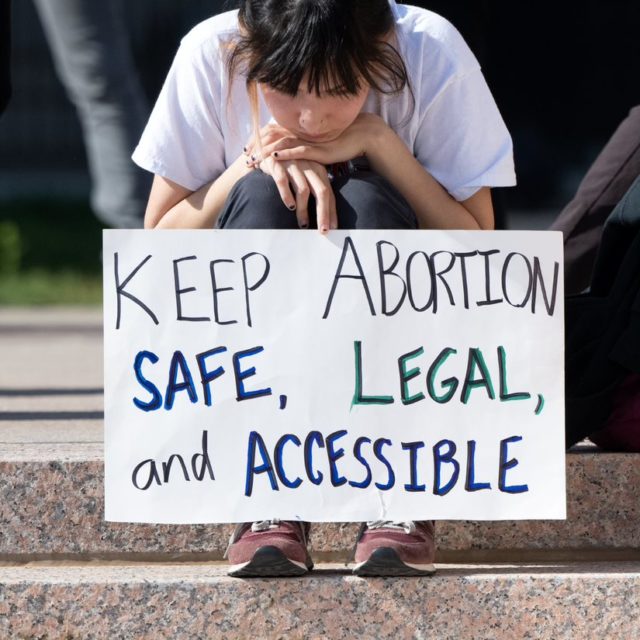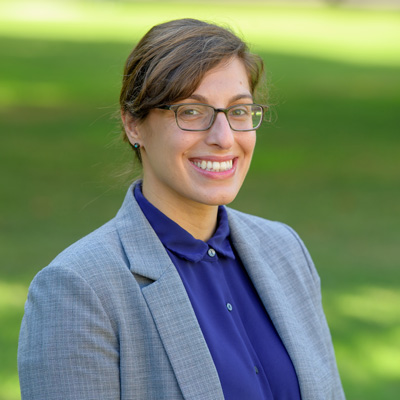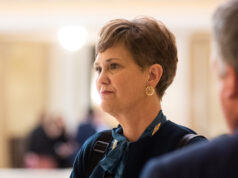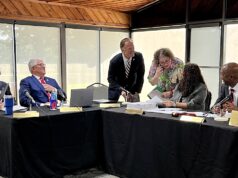

(Editor’s note: Some interviews for the following story were conducted prior to the official June 24 release of the U.S. Supreme Court decision in Dobbs v. Jackson.)
With the U.S. Supreme Court overturning Roe v. Wade and triggering Oklahoma laws that equate to a near total ban on abortion, some people are hoping the sovereign nature of recently affirmed Indian Country reservations could allow for access to abortion services in eastern Oklahoma.
How that could happen is a matter of speculation at this point. One option would involve a tribal government implementing creative accounting practices to prevent federal funds from being used at any new clinic offering abortions. (Tribal leaders say that option is not being considered.)
The other option would be for a tribal citizen physician to open a private practice in eastern Oklahoma to offer abortion services. Owing to the McGirt v. Oklahoma decision, the state would have no jurisdiction to prosecute that tribal citizen for violating state statutes that criminalize abortion.
‘The brunt of those decisions’
The women behind Matriarch, an organization founded to assist Indigenous people with health and wellness education, would like to see abortion remain accessible in Oklahoma, one way or another.
“The conversations that we’ve had in our community are ongoing,” Matriarch co-founder Sarah Adams said. “How do we provide abortions? Do we need to stock up on certain medications so that we can serve our communities? Even then, it is still very problematic. The end of [Roe v. Wade] will absolutely impact our communities. It will hit hardest, as do all of these issues, with people who are oppressed or who are poor or who are Black or brown or queer. They will bear the brunt of those decisions.”
Founded six years ago and with chapters in Tulsa and Oklahoma City, Matriarch started with the goal of helping Indigenous youth.
“We are a nonprofit for nonbinary, two-spirit people and kids, and it started because there was a big outbreak of youth suicide in our communities, and moms were needing services and there really weren’t any,” Adams said.
The existence of groups like Matriarch and public statements from pro-choice tribal citizens have convinced some anti-abortion advocates and politicians that the battle to ban abortion in Oklahoma has now shifted to Indian Country.
In a May appearance on Fox News, Gov. Kevin Stitt even suggested that tribal governments are preparing to use their expanded jurisdiction under McGirt to do just that.
“You know, the tribes in Oklahoma are super liberal,” he said. “They go to Washington, D.C. They talk to President Biden at the White House, and they kind of adopt those strategies. So yeah, we think that there’s a possibility that some tribes may try to set up abortion on demand. They think that you can be 1/1,000th tribal member and not have to follow the state law. And so that’s something that we’re watching.”
The subject came up in a June 22 debate among GOP candidates running for Oklahoma’s 2nd Congressional District. Wes Nofire, who is a member of the Tribal Council of the Cherokee Nation, said his tribe’s chief is planning to set up abortion clinics on tribal land.
“We do have the rogue agenda administration over at the Cherokee Nation,” Nofire said in the debate. “We call them ‘the problem child.’ They don’t want to sit down because they are in two-step with Joe Biden and his administration trying bring that right here to the most conservative state — in Oklahoma. They’re trying to put illegal abortion clinics right here on the reservation and we don’t want to see that.”
Nofire claimed he has been prevented from introducing new rules around abortion.
“They’ve tried to stop me from bringing abortion law to the Tribal Council by placing new rules and procedures in there,” he said. “Instead of having one councilmember who can bring it forward as a sponsor, they’ve changed that to five, which has effectively made — there’s no justice for our citizens out there to have representation anymore.”
Cherokee Nation Principal Chief Chuck Hoskin Jr. fired back at Nofire in an email to NonDoc. Hoskin said Nofire is stoking fear for political gain.
“Cherokee Nation health centers are prohibited from using federal money to perform abortions except in cases of rape, incest and when necessary to save the life of the mother and will not set up abortion clinics,” Hoskin said. “We will not tolerate fear-mongering from those who want to use this decision as a political tool, such as Wes Nofire. This is a serious topic for the Cherokee Nation and for Oklahoma, and (it) shouldn’t be used as a ploy for candidacy or to fight tribal sovereignty.”
Hoskin also took issue with Nofire’s claim that he has attempted to bring abortion-related legislation to the Tribal Council.
“Mr. Nofire has been absent from Council meetings during the past two months and has not introduced any legislation to the Council of the Cherokee Nation on this issue,” Hoskin said.
Abortion safe haven unlikely

Despite Stitt’s Fox News pronouncement and Nofire’s debate-stage declaration, the idea of abortion safe havens on Indigenous land in Oklahoma appears not to be grounded in much reality. For starters, since health clinics on native land receive money from the federal government, the Hyde Amendment bans them from conducting abortions using federal dollars, Indiana University McKinney School of Law professor Aila Hoss said.
“The Hyde Amendment and its iterations have cropped up, and right now that means federal funds cannot be used at Indian Health Services facilities for abortions with a few exceptions, including rape,” Hoss, who previously taught Indian law at the University of Tulsa, said. “But there is also a lot of inconsistency on the ground as far as what is required to document those exceptions, and there are also not a lot of facilities that had been providing services anyway.”
Jason Hill, chief medical officer of the Choctaw Nation Health Services Authority, echoed that view in response to Stitt’s Fox News appearance.
“The Choctaw Nation of Oklahoma does not provide abortion services,” Hill said in a statement prior to the official SCOTUS ruling in Dobbs v. Jackson Women’s Health Organization, the case that reversed the Roe v. Wade precedent. “Therefore, our activities are not affected by recently signed state legislation or by expected changes to how the U.S. Constitution is interpreted. Due to being federally-funded, we are prohibited from performing abortion services. As always, our health clinics and medical professionals are focused on providing the best care possible for their patients.”
The Indian Self Determination and Education Assistance Act, also known as Public Law 93-638, was enacted in 1975. Its purpose was to ensure “effective and meaningful participation by the Indian people in the planning, conduct, and administration” of Federal services and programs provided to tribal nations and their citizens. It provided tribes with the option to exercise their sovereignty by either assuming the administration and operation of programs, services, functions and activities from the Indian Health Service or continuing to receive health care through the IHS-administered, direct-care health system.
There are ways around the Hyde Amendment, however. For one, tribes could segregate federal funds from other funds that could be used for abortions without violating the law.
“A way to get around the Hyde Amendment is the same way the states do it,” Hoss said. “They applied to Medicaid that was subsequently expanded to other programs. States have used Medicaid programs that provide coverage for abortion care, they are using non-federal funds. In theory, legally, a tribal health facility could provide care, but they must do it outside the scope of [Public Law 93-638].”
And that maneuver could create other problems, Hoss said.
“If a tribe is providing care outside the scope of 638, they then have to navigate where the providers are licensed,” Hoss said. “This raises issues because once you’re out of the federal scheme, then our traditional rules of civil litigation apply. Medical and tort license falls under civil jurisdiction. In Indian Country, that is complicated. A state could argue their state laws should apply.”
How the courts would rule is anyone’s guess, Hoss said, adding that the McGirt decision won’t make tribal lands a safe haven for abortions, or at least not without a lot of “lawyering.”
“I think it’s a misunderstanding of McGirt or a fatal misunderstanding of Indian law,” Hoss said. “McGirt changed the way we recognize and re-affirm boundaries that had been ignored for a long time, which is significant for criminal and civil law. Basically, it means we have to apply these legal tests, which can be complicated and unpredictable.”
Underscoring the “unpredictable” nature of the discussion, those applications became even more complicated June 29 when the SCOTUS released its decision in Oklahoma v. Castro-Huerta and granted states concurrent jurisdiction to prosecute non-tribal citizens who commit crimes against tribal citizens. The majority opinion has been described by scholars as a fundamental shift in Indian law interpretation.
‘Indigenous women have been left out of the conversation’
For Adams and the women she works with at Matriarch, it has been a frustrating couple of months. The May leak of the draft opinion in Dobbs v. Jackson stirred angst and dread, though it did not catch her by surprise. To Adams, it’s just more of the same: an ongoing conversation about women’s rights that often leaves Indigenous women out of the discussion.
“I’m not as surprised and shocked as some are,” Adams said. “Indigenous women have been left out of the conversation around reproductive health for a long time. With forced sterilizations that happened to previous generations up until the 1980s, the government has always been trying to control how we grow our families, so it’s not shocking.”
Adams remembers that, when she first became pregnant, family members warned her not to go to the tribal clinic for care because they believed the services offered could be dangerous. Today, she said, things are better but still far from perfect.
“The services are a lot better, but with the Hyde Amendment that was passed and re-authorized in the 1990s, there are only three exceptions for performing an abortion: rape, incest and risk to the mother’s life,” Adams said. “But, even then, many of those hospitals don’t have everything they need to provide abortions.”
Beyond those issues, Adams said, attitudes around abortion vary from tribe to tribe, and Indigenous people have a wide variety of opinions about it.
“It definitely varies depending on the tribe and whether that tribe is primarily in an urban or rural area,” she said. “I think most Indigenous people have always supported the right to choose how and when they grow their families. We’ve always had our own medicines to prevent and end pregnancy that were practiced for a long time. But also, many of our tribal governments are very patriarchal and have adopted the idea that abortion is not OK and money and resources should not be spent on it.”
‘Safe haven’ narrative seen as insensitive
Following the Dobbs decision, some on social media urged tribes or the federal government to open abortion facilities. But Indigenous women faced obstacles when it came to obtaining abortion services even when the Roe v. Wade precedent was still in effect.
That’s one reason why some Indigenous women have found the idea of the “safe haven” narrative offensive.
Stacy Leeds, a Cherokee citizen and law professor at Arizona State University, said in a recent interview with Voice of America that the pleas are an extension of colonization.
“Any time there’s a call for tribes to do something that is not originating in their own thought processes, it very much just reeks of further colonization,” said Leeds. “You know, the outsider trying to tell a local tribal government what their law and policy ought to be.”
Anishinaabe artist and organizer Ashley Fairbanks offered similar perspective on Twitter.
“Even if it were legally possible to set up abortion clinics on every reservation, LMAO at the idea that Native folks should be y’all’s savior and take on all that risk after you’ve spent centuries either trying to kill us or ignoring us,” she said.
Along with fellow law professors Lauren van Schilfgaarde, Sarah Deer and Ann Tweedy, Hoss and Leeds recently published a piece on the “safe haven” fallacy. The piece concluded with pushback for those late to the fight.
“To turn to tribes now is galling,” the last paragraph begins. “It reveals a disappointing ignorance of the legal battles tribes have been fighting, seemingly without end. But it also reveals a problematic disregard for the trauma and vulnerability that Native peoples face. No, tribes do not offer a safe-harbor from harmful state abortion prohibitions. It’s time we step up to address why.”




















